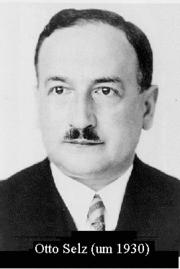- Otto Selz
-
Otto Selz (14 February 1881 – 27 August 1943) was a German psychologist from Munich, Bavaria, who formulated the first nonassociationist theory of thinking, in 1913.[1][2][3] Selz used the method of introspection, but unlike his predecessors, his theory developed without the use of images and associations. Wilhelm Wundt used the method of introspection in the 1880s, but thought that higher-level mental processes could not be studied in the scientific laboratory.
Selz's ideas anticipated some major concepts in modern cognitive psychology, including the following:
- The unit of thought is the directed association.
- Understanding a problem involves forming a structure.
- Solving a problem involves testing for conditions.
Selz was an associate professor of legal philosophy at the University of Bonn, 1921-1923. From 1923 to 1933, Selz was a full professor of philosophy, psychology, and pedagogy of the Mannheim Business School. He also served as the Rector of the Graduate School of Mannheim, 1929-1930.[4] Selz's career was shortened by Nazi policies in Europe, which banned him from his profession in Germany because he was Jewish. In 1938, he was imprisoned in Dachau concentration camp, but was released after five weeks. In 1939, Selz emigrated to the Netherlands, teaching and researching (sometimes unofficially) in Amsterdam until 1943. On July 24, 1943, he was arrested and detained in Westerbork concentration camp. A month later on August 24, he was transported to Auschwitz concentration camp. Three days later, on August 27, 1943, Selz died in the vicinity of Auschwitz.[5]
Until recently, his works were largely untranslated from German into English.
In 2004, philosopher and psychologist Michel ter Hark, University of Groningen, published a book called Popper, Otto Selz and the Rise of Evolutionary Epistemology, in which he argues that Karl Popper got part of his ideas from Selz. Selz himself never published these ideas, partly because of the rise of Nazism which forced him to quit his work in 1933, and the prohibition of referencing to Selz' work.
Contents
Works (in German)
- 1910: "Die psychologische Erkenntnistheorie und das Transzendenzproblem" ("The psychological theory of knowledge and the problem of transcendence"). Archiv fur die gesamte Psychologie 16, 1–110.
- 1913: Über die Gesetze des geordneten Denkverlaufes. Eine experimentelle Untersuchung (On the laws of the orderly thought process. An experimental investigation). Speemann, Stuttgart.
- 1919: (with W. Benary, A. Kronfeld and E. Stern) Untersuchungen über die psychische Eignung zum Flugdienst (Studies on the psychological fitness for flight duty). Schriften zur Psychologie der Berufseignung und des Wirtschaftslebens, Heft 8. Barth, Leipzig.
- 1922: Zur Psychologie der produktiven Denkens und des Irrtums (On the psychology of productive thinking and of error). Cohen, Bonn.
- 1924: Die Gesetze der produktiven und reproduktiven Geistestätigkeit (The laws of the productive and reproductive mental activity). Cohen, Bonn.
- 1991: Wahrnehmungsaufbau und Denkprozeß (Perceptual system and thought process). Selected writings, edited by A. Métraux and T. Hermann. Huber, Bern. ISBN 3-456-81941-2.
References
- ^ Otto Selz, German psychologist February 14 in History at www.brainyhistory.com
- ^ Otto Selz, German psychologist (In Auschwitz), dies August 27 in History at www.brainyhistory.com
- ^ http://www.osi.uni-mannheim.de/otto_selz/index.html
- ^ http://www.osi.uni-mannheim.de/otto_selz/index.html
- ^ http://www.osi.uni-mannheim.de/otto_selz/index.html
Further reading
- Frijda, Nico H.; de Groot, Adriaan D., eds (1981). Otto Selz: his contribution to psychology. Mouton. ISBN 978-90-279-3438-3.
- Ter Hark, Michel. (2004). Popper, Otto Selz and the rise of evolutionary epistemology. Cambridge: Cambridge University Press.
- Ter Hark, Michel. (2010). The Psychology of Thinking Before the Cognitive Revolution: Otto Selz on Problems, Schemas, and Creativity. History of Psychology, 13(1), 2–24.
- Mayer, R.E. (1992). Thinking, problem solving, cognition. New York: W.H. Freeman and Company.
External links
- Bio of Otto Selz at the University of Mannheim (in German).
Categories: 1881 births | 1943 deaths | Cognitive scientists | German Jews | German psychologists | Jewish scientists | Auschwitz concentration camp victims | People from Munich | People from the Kingdom of Bavaria | Humboldt University of Berlin alumni | Ludwig Maximilian University of Munich alumni | University of Bonn faculty | University of Mannheim faculty | German civilians killed in World War II
Wikimedia Foundation. 2010.

